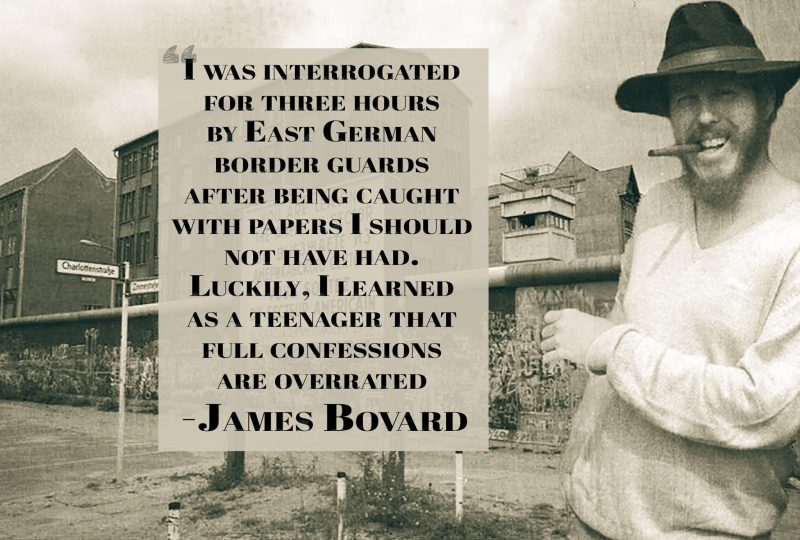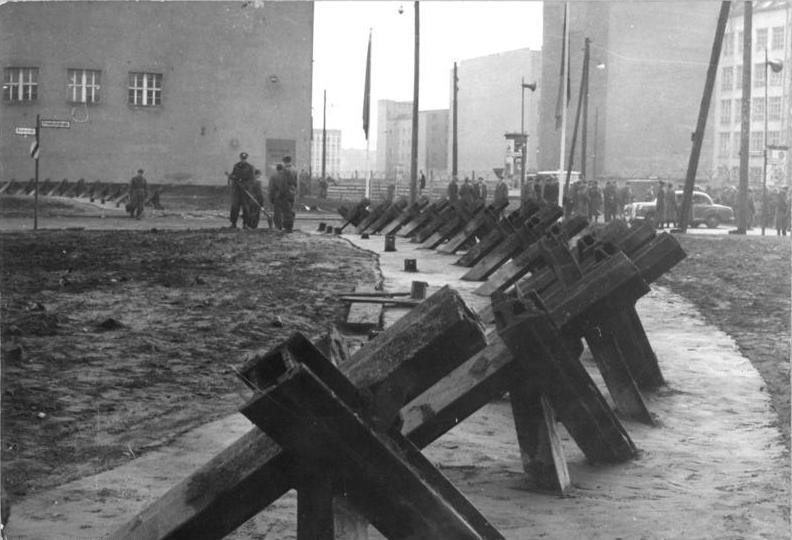Here are two more jpegs for that article created by Natalie Fawn Danelishen, the media graphics artist for the Mises Institute. Natalie does great work; if you need an artist, contact her.
Mises Institute Blog, February 15, 2018
How the Berlin Wall Spurred My Biggest Blunder
by James Bovard
In February 1987, I ventured into Czechoslovakia to investigate the environmental collapse of the East Bloc. After a few days roaming Prague and the Czech countryside, I rented an utterly unreliable car and headed north to Dresden, East Germany. The car sputtered as I climbed the snowy Erzgebirge mountains to the Czech-East German border crossing at Zinnenwald.
Exiting Czechoslovakia proved more difficult than expected. Czech border guards seemed enraged at the sight of me, repeatedly rummaging through my baggage and railing at me as if I was a hooligan. I muzzled my retorts because I had entered their country illegally, relying on a tourist visa instead of a journalist visa. When I had revealed that technicality to the press attache at the U.S. embassy in Prague, she almost started to cry, fearing that my arrest would cause a nuisance for the embassy staff. Visiting the US embassy (which was heavily bugged) probably put me on the regime’s Enemies List.
The Czechs finally gave me one last cussing and sent me on my way. But a pair of tall young East German soldiers had seen the hubbub on the other side of the border and also felt entitled to some fun. They searched every square inch of the rent-a-car — even underneath the vehicle.
Then they marched me to a shack next to the border station and dumped my shoulder bag’s contents on a table. The guards pawed each sock and scrupulously checked my German-English dictionary for misspellings. Their attention shifted to ‘Der Osten Ist Grun? [The East is Green?] — a left-wing book on Eastern European environmental problems.
“Is this your book?” the senior guard demanded to know.
“Nein — that is my Fraulein’s book. She said I should read it if I get bored.”
He sifted the remaining items in the bottom of my shoulder bag and discovered a stack of pages of notes on Soviet Bloc environmental problems. Damn, I thought — East Berlin border guards never searched that deep. I had expected to breeze through since I was arriving from a neighboring communist regime.
“Are these your notes?” he asked grimly.
“No — those are mein Fraulein’s in Hamburg — she is interested in environmental problems, but I don’t know so much about it.”
“Is she a member of the Green Party?”
“No, she is not that bad.”
They cross-examined me a bit more, then took me back to my car, where I sat for half an hour while the border guards phoned their superiors in Berlin — or perhaps nearby Dresden.
And then they returned, walking grimly like a burial entourage at a state funeral. I was ordered to follow them to a much larger threadbare building fifty yards from the border crossing. East German and Czech tourists looked aghast: “They caught a spy — an infiltrator!” To this peanut gallery, my Aussie-style canvas hat looked like an American cowboy hat.
I was locked into a conference room and interrogated off-and-on for the next three hours. As with Czechoslovakia, I was entering East Germany illegally, relying on a tourist visa while working on assignment.
Luckily, I had learned during my teenage years that full confessions are overrated. And I owed no candor to regimes built on lies and oppression. Communist regimes were theocracies based on the worship of economic statistics. Dead trees, pervasive bronchitis, and stratospheric cancer rates were a small price to pay for higher steel output.
The first East German officer to interrogate me demanded to know: “Have you ever been to the Deutsche Democratic Republic before?” I had been to his country lots of times, but that tidbit would do nothing to resolve this impasse. “Ich bin nur ein Student,” [I am only a student] I said in primal Deutsch. And if he wondered why I was a bit old (30) for a student, I was obviously a slow learner, considering how I mangled his language.
This lead-off hitter zeroed in on my notes. Luckily, like all my elementary school teachers, the guards were baffled by my handwriting — a mix of cursive, printing, and seemingly random smears.
Roughly 45 minutes later, I was cross-examined by his superior who zeroed in on that book. In a mix of German and English, the second military officer demanded to know if I was interested in East German environmental problems. I assured him that I was only interested in American environmental problems — and he was relieved to hear that things were just as bad in the US.
Another ample period to meditate on my sins ended with the arrival of the senior commander of the border post. Or perhaps this guy had traveled in from nearby Dresden for the occasion.
The short, heavy-set chief entered the room as if he might be a low-wattage Grand Inquisitor. Happily, he spoke almost no English. I answered a third of his questions with a tilt of the head and “Kein Verstehen.” [I don’t understand]
He took pains to explain that all my notes would be confiscated — along with the book. He did not seem particularly angry, merely doing his duty. He was probably near retirement, and my case was just one more flea bite on the way to a pension.

Ministerium für Staatssicherheit (MFS or Statsi) / Ministry for State Security / East Germany
2005.12.03
I had no quibble about the seizure of my notes — especially since I had mailed copies to a north German address before traveling to Prague. And that damn book had already been more trouble than it was worth.
During the searches that day, I forgot to mention the little notebook chockful of observations on environmental debacles that I jammed inside the front of my underwear before arriving at the border. If the guards had found that trifle — along with the U.S. Senate press pass in my wallet — my stay in the East Bloc might have been extended indefinitely.
I eventually persuaded the officials to let me travel on my way to Leipzig. Perhaps they concluded that I was too stupid to do any harm. I assumed I would be tailed by the Stasi, the East German secret police, as I proceeded to Dresden, Leipzig, and East Berlin. But I always appreciated that the East German border bouncers, unlike Transportation Security Administration screeners, never tried to turn my family jewels into a pancake.




Comments are closed.